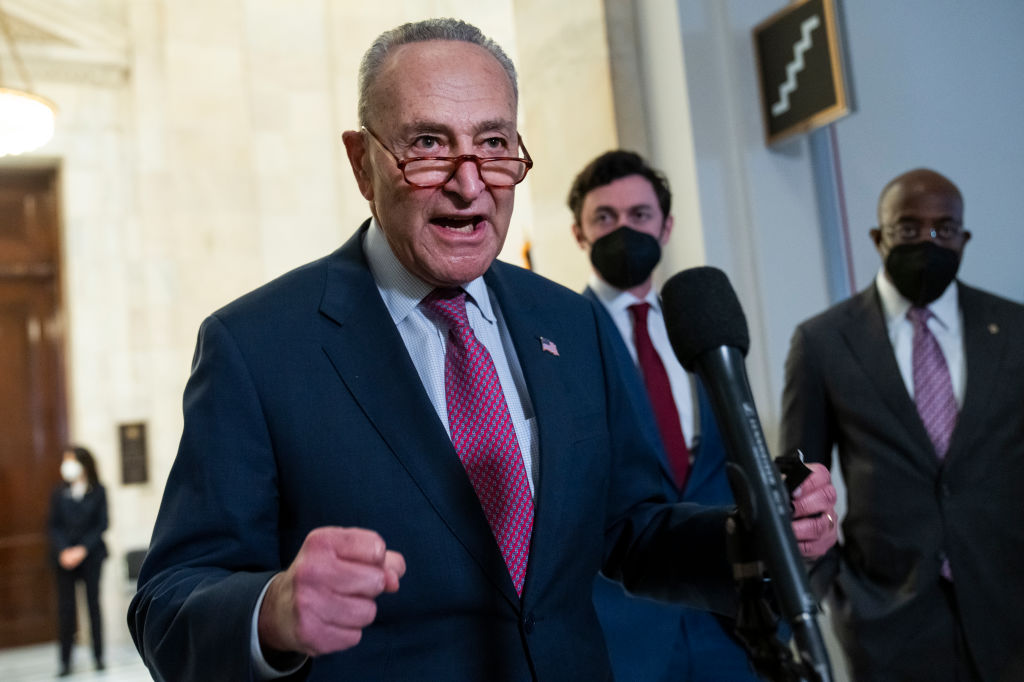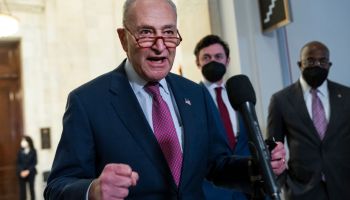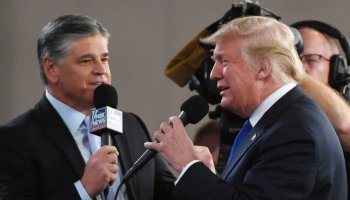
Source: Tom Williams / Getty
Days after, President Joe Biden called for a Senate rule change to make way for the passage of voting rights legislation, and the White House is pushing for action. As the Senate Democratic caucus continues negotiations over a possible voting rights exception to the filibuster, White House Senior Advisor Cedric Richmond said Senators straddling the fence need to remember that voting rights are the bedrock of democracy.
“The rules are a means to an end,” Richmond said. “The end here is voting rights in constitutional and free and fair elections, and we should not let a Senate rule that was rarely used for 100 years.
He called this a defining moment in American history. As of Thursday, it’s unclear where the Senate Democratic caucus will fall on a vote for the rule change, with Sen. Kyrsten Sinema still publicly expressing opposition to even a narrow carve-out for voting rights.
Combined into one bill, the Freedom to Vote: John R. Lewis Act passed the House along party lines Thursday with no Republicans joining in support. Once again, the fate of voting rights in America rests with the Senate.
Before losing the majority, Senate Minority Leader Mitch McConnell refused to allow an earlier iteration of the John Lewis Voting Rights Advancement Act to be brought to the floor. After Rep. John Lewis passed away, McConnell claimed to honor and respect Lewis but blocked voting rights legislation.
In the minority position, McConnell is pushing members of his party to toe the line and not support any Democratic legislation, including voting rights, despite voting to reauthorize the Voting Rights Act in 2006.
Opposition to a carve-out in favor of voting rights is grounded in a false narrative of institutional honor and rules as partisan attacks on democracy ramp up across the country. As an MSNBC article recently noted, “Senators are entitled to their own opinions, but they’re not entitled to just make up historical details that don’t exist.”
For his part, Manchin has previously said he wants to maintain the 232-year tradition of the Senate intact, except the filibuster did not exist when the Senate was first created. Also, prioritizing an antiquated system that fails to meet the needs and values of the American people raises questions about what Manchin and Sinema hope to accomplish with their opposition.
“Whose side do you want to be on the side of George Wallace, Connor and Jeff Davis, or you want to be on the side of Martin Luther King, John Lewis and Abraham Lincoln,” “Richmond said. “his one of those moments where people will judge your legacy based on it.” Unlike the bipartisan infrastructure plan, he said that no Republicans are willing to protect the Democratic process.
“The President has never shied away from his desire to compromise,” “Richmond said. “He’s never shied away from his desire to do things in a bipartisan manner. But you have to have people on the other side that are willing to come to the table. And so far, we’ve not seen many Republicans that are willing to display the courage necessary to come forward.”
Recalling the passage of the 15th Amendment during a press conference Thursday, Rep. Jim Clyburn explained that formerly enslaved Black people got the right to vote by a straight party-line vote.
While much of the focus has been on Manchin and Sinema, reports this week suggests SSinema’sArizona colleague Sen. Mark Kelly is undecided on where he stands on the rule change. Some perceive preserving the filibuster as critical to re-election despite the overwhelming support for action on voting rights.
“I’ll just say to those Senators that the election or job they save may be their own,” Richmond said. “It’s that important to make sure people can come out and vote.”
Sen. Angus King has favored the proposed Senate rule change to pass needed voting rights legislation. An independent who caucuses at times with Democrats, King has previously expressed his reluctance to change the filibuster but is now on board with a rule change to pass voting rights legislation.
“It’s ironic in the extreme to enshrine the principle of bipartisanship here in the Senate to the extent that we can’t repair the damage done to the democracy by 100% partisan legislatures around the state,” King said. “I’m all for bipartisanship, but in this situation, that doesn’t seem to be in the offing.”
The last time the Voting Rights Act was authorized, 16 Republican Senators, including McConnell, voted for its passage. Republicans who supported subverting democracy in favor of Trump’s big lie are now trying to cry foul in the face of legislation to correct gaps in existing law and provide greater uniformity in federal elections. But in 2017, Republicans used a filibuster rule change to move forward the nomination of Supreme Court Justice Neil Gorsuch.
“The Senate owes it to all Americans, and especially Black and brown communities, to pass #votingrights legislation today,” tweeted Taifa Butler, president of the think-and-do-tank Demos. “It is the only way to ensure a just, inclusive multiracial democracy in America. The right to vote should not be partisan. It is American.”
SEE ALSO:
Biden Finally Calls For Senate Filibuster Rule Change To Pass Voting Rights Legislation
President Biden Finally Gets Serious About Voting Rights, Hopefully IIt’sNot Too Late.
White House Presses Senate Holdouts On Filibuster Rule Change As John Lewis Voting Rights Bill Hangs In The Balance was originally published on newsone.com
















